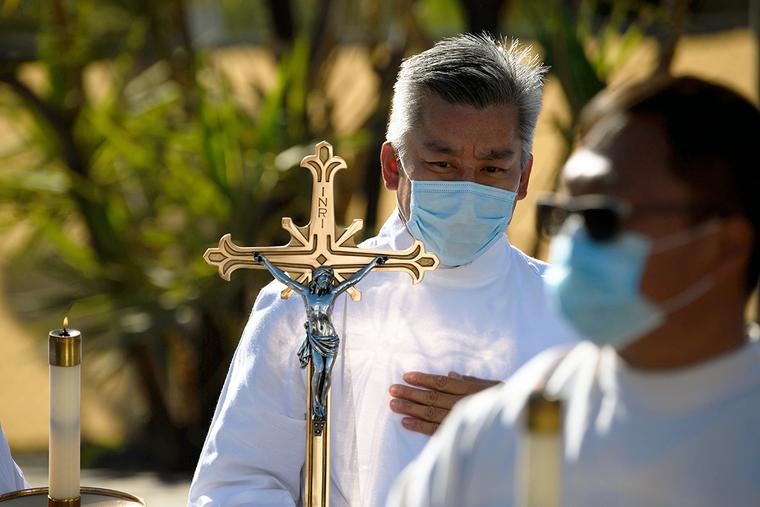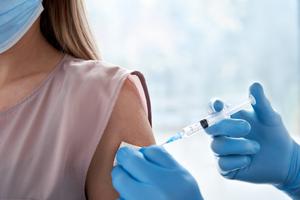Acting on Lessons Learned
COMMENTARY: When crises come, the Church is not supposed to cower on the sidelines, seemingly useless.

On May 1, as the initial panicked phase of the battle against COVID-19 was concluding, I wrote that the most important and urgent lesson Church leaders needed to learn coming out of the first phase was the disaster of acquiescing as various civil leaders attempted to treat the Church’s activity and worship as a “non-essential” service.
It’s not surprising, I said, that those who do not believe in God might think that the life of faith is non-essential. It’s similarly unremarkable that Catholics who no longer practice the faith, who do not deem it essential to their life, might also reckon it unnecessary in the lives of others. But that the Church — clergy, religious and faithful alike — would not thunderously protest against such a gross mischaracterization, and in some places would behave as if she agreed with that description, was scandalous.
That’s the lesson that was unwittingly taught when the Church in some locales made the decision to lock churches and forbid all access to the sacraments, except for priests, even when such decisions were not required by public mandate. It was reinforced when such decisions were made as if they were not particularly vexing. It was cemented when certain Church leaders insisted that even practical solutions fully in alignment with medical and government directives on safety be shut down, like drive-in Masses, confessions at safe distances in parking lots, anointing of those dying of non-communicable diseases, all adoration of the Blessed Sacrament, as well as all baptisms, weddings and funerals.
Pastors have since seen the consequence that such decisions, treating the practice of the faith as de facto non-essential, have had: The percentage of those who had been regularly coming to Mass in February who have returned to Church after the spiritual lockdown is, in most places, a quarter to a third; those where it is 50% of pre-shutdown numbers are doing relatively well. Some are watching the Mass livestreamed because they’re in at-risk populations, care for those who are, or simply prefer it. Many of those who are not coming seem to have deprioritized Mass altogether.
It has also become clear that the compelling health justification that had been given by civil leaders can no longer be considered credible. Churches were closed as non-essential but liquor stores and marijuana dispensaries remained open? Eleven masked parishioners could not come together in a Church fitting a thousand but 11,000 unmasked and non-socially-distanced BLM protesters could convene in a crowded courtyard? The inconsistent decisions of civil leaders made plain that something else was at work rather than legitimate concern for public health.
Certain shepherds began to fight back in defense of their people, their rights and their spiritual good. Bishop Nicholas DiMarzio of Brooklyn, Archbishop Joseph Kurtz of Louisville and Archbishop Salvatore Cordileone of San Francisco took the lead.
Legitimate health-related restrictions were one thing; discriminatory restrictions contrary to religious freedom — both a natural and a constitutionally-protected right — were another. The prelates were now, moreover, armed with data to respond to the ludicrous, hyperbolic and phobic assertion that religious gatherings were somehow super-spreading disasters waiting to happen. Since churches reopened in May with proper safety protocols, there has not been one reported case of someone getting COVID-19 at a Catholic church anywhere in the country.
Supreme Court justices recognized what was happening and ultimately overturned such restrictions.
In a decision fittingly announced the day before Thanksgiving in a case in which Bishop DiMarzio sued New York Gov. Andrew Cuomo, Justice Neil Gorsuch lacerated the governor’s decisions in a concurring opinion.
“The businesses the Governor considers essential include hardware stores, acupuncturists, and liquor stores. Bicycle repair shops, certain signage companies, accountants, lawyers, and insurance agents are all essential too,” he wrote in Diocese of Brooklyn v. Cuomo. “So, at least according to the Governor, it may be unsafe to go to church, but it is always fine to pick up another bottle of wine, shop for a new bike, or spend the afternoon exploring your distal points and meridians. Who knew public health would so perfectly align with secular convenience?”
He continued that in New York “people may gather inside for extended periods in bus stations and airports, in laundromats and banks, in hardware stores and liquor shops. No apparent reason exists why people may not gather, subject to identical restrictions, in churches or synagogues, especially when religious institutions have made plain that they stand ready, able, and willing to follow all the safety precautions required of ‘essential’ businesses and perhaps more besides. The only explanation for treating religious places differently seems to be a judgment that what happens there just isn’t as ‘essential’ as what happens in secular spaces. Indeed, the Governor is remarkably frank about this: In his judgment laundry and liquor, travel and tools, are all ‘essential’ while traditional religious exercises are not. That is exactly the kind of discrimination the First Amendment forbids.”
Justice Samuel Alito has been similarly outspoken. In a July dissent in Calvary Chapel v. Silolak, a case in which the governor of Nevada had permitted casinos to have 50% occupancy but limited churches to 50 people, Alito wrote:
“The Constitution guarantees the free exercise of religion. It says nothing about the freedom to play craps or blackjack, to feed tokens into a slot machine, or to engage in any other game of chance. But the Governor of Nevada apparently has different priorities.”
He elaborated on the unconstitutional hypocrisy of such decisions — and what they presage — in a Nov. 12 speech to the Federalist Society’s National Law Conference.
“It pains me to say this,” he stated, “but in certain quarters, religious liberty is fast becoming a disfavored right. Over the summer, the Supreme Court received two applications to stay COVID restrictions that blatantly discriminated against houses of worship. … If you go to Nevada, you can gamble, drink and attend all sorts of shows. But … if you want to worship and you’re the 51st person in line, sorry, you are out of luck. Houses of worship are limited to 50 attendees. The size of the building doesn't matter. Nor does it matter if you wear a mask and keep more than six feet away from everybody else. And it doesn’t matter if the building is carefully sanitized before and after a service. The state’s message is, ‘Forget about worship and head for the slot machines or maybe a Cirque du Soleil show.’”
These justices demonstrate that what we’re not dealing with is not imperative decisions to prevent the spread of COVID-19, the super-saturation of ICUs and the ensuing suffering and death of thousands each day. We’re dealing with baldly unconstitutional discrimination against religious believers and their houses of worship. And it seems, with the confirmation of Justice Amy Barrett, that such undisguised bias will no longer be countenanced.
That leaves the Church in a position now to do what it should have been doing from the beginning: taking a leading spiritual and moral role in response to the crisis, helping to guide and augment people’s prayer, forming them in the courage and compassion needed to care perseveringly for those in need, educating and animating the young, bringing people into communion — if even socially-distanced or virtually — to overcome injurious isolation, and assisting everyone to find meaning in suffering and even death.
When crises come, the Church is not supposed to cower on the sidelines, seemingly useless. Catholics are called, rather, individually and organically, to unleash our God-given competencies and charisms, and to make the Eucharist we humbly receive consequential.
- Keywords:
- coronavirus
- religious liberty

















